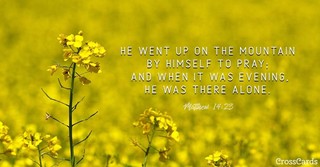
- Recent Translations
- All Translations
Matthew 14:23
Share
Settings
Images for Matthew 14:23

Matthew 14:23 in Other Translations
Matthew 14:23 Meaning and Commentary
And when he had sent the multitudes away
Had ordered them at least to go away; for, it seems, according to ( John 6:22 ) that they did not in general disperse: there was a large body of them that continued upon the spot all night, expecting his return; in which being disappointed, they took shipping, and came to Capernaum.
He went up into a mountain apart to pray;
perhaps the same he went up to before, and from whence he came down, ( John 6:3 ) . This he chose as a proper place for prayer, where he could be retired, and alone, have his thoughts free, and, as man, pour out his soul to his Father, on his own account, and on the behalf of others; and particularly, he might be concerned about this notion of a temporal kingdom, that his disciples and others were so fond of; and pray that his disciples might be convinced of their mistake, and that the people might be hindered from prosecuting their designs. His going up into a mountain and praying there, were quite contrary to the canons of the Jews; which forbid praying in places ever so little raised.
``Let not a man stand (say they F13) (hwbg Mwqmb) , "in an high place", and pray, but in a low place and pray; as it is said, "Out of the depths have I cried unto thee, O Lord", ( Psalms 130:1 ) . It is a tradition, that a man may not stand, neither upon a throne, nor upon a footstool, nor in any high place and pray, because there are no high places before God.''This rule is delivered by Maimonides F14, in this form:
``A man may not stand in a place that is three hands high, or more, and pray, neither upon a bed, nor upon a seat, nor upon a throne.''But Christ did not look upon himself obliged, by these traditions of the elders; but chose such places, whether high or low, which were most private and retired.
And when evening was come;
when it was now dark, ( John 6:17 ) when the second evening was come and ended; see ( Matthew 14:15 ) and it was properly night,
he was there alone;
in the mountain, where he continued the greatest part of the night, even until the fourth watch.
F13 T. Bab. Beracot, fol. 10. 2. Piske Tosaph. in ib. art. 52, T. Hieros. Beracot, fol. 4. 4. Kotsensis Mitzvot Tora precept. Affirm. 19. Midrash Kohelet, fol. 70. 3.
F14 Hilch. Tephillah. c. 5. sect. 7.
Matthew 14:23 In-Context
Cross References 1
-
1.
S
Luke 3:21